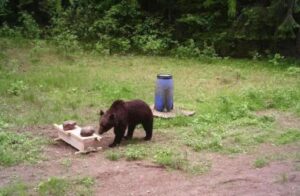You’ve probably seen the viral videos: gorillas, orangutans, and chimpanzees spinning round and round until they fall over in an elated state of dizziness. Now researchers publishing a study in Primates magazine hope to use the behavior to unlock mysteries around the effects of mind-altering substances on the development of our earliest ancestors.
There’s no question that humans worldwide seek altered mental states in various ways and have since before recorded history began. Meditation, fasting, and chemical substances (naturally occurring and purposefully created) are all traditional methods. But if you happen to be a child or a chimpanzee, your mind-trip method of choice is likely twirling.
Messing with our minds
“Spinning alters our state of consciousness, it messes with our body-mind responsiveness and coordination, which make us feel sick, lightheaded, and even elated as in the case of children playing in merry-go-rounds, spinner-wheels, and carousels,” Dr. Adriano Lameira, associate professor of psychology at Warwick and study co-leader, told the BBC.
“If all great apes seek dizziness, then our ancestors are also highly likely to have done so. We asked ourselves what role these behaviors play when it comes to the origins of the human mind,” he continued.

Perhaps the greatest graphic this journalist has come across in his time poring over peer-reviewed studies. Illustration: Adriano Lameira, Marcus Perlman
After watching hours of videos of apes pirouetting on vines, in pools, and in leaf piles, researchers concluded that the resulting dizziness was the point of the behavior and not a coincidental byproduct of the pinwheeling itself. The distinction is important. As Lameira and his co-authors note, wild primates routinely consume fermented foods and experience altered mental states, but those effects might be accidental.
Concluding their paper, the authors point out the need for additional studies. Determining that humans and our fellow great apes share a need to seek out altered mental states is one thing. Understanding why that is the case, and how such states may have shaped the evolution of the human mind is the larger mystery.
Of course, it could just be an excellent excuse to watch orangutans spin around on vines.






